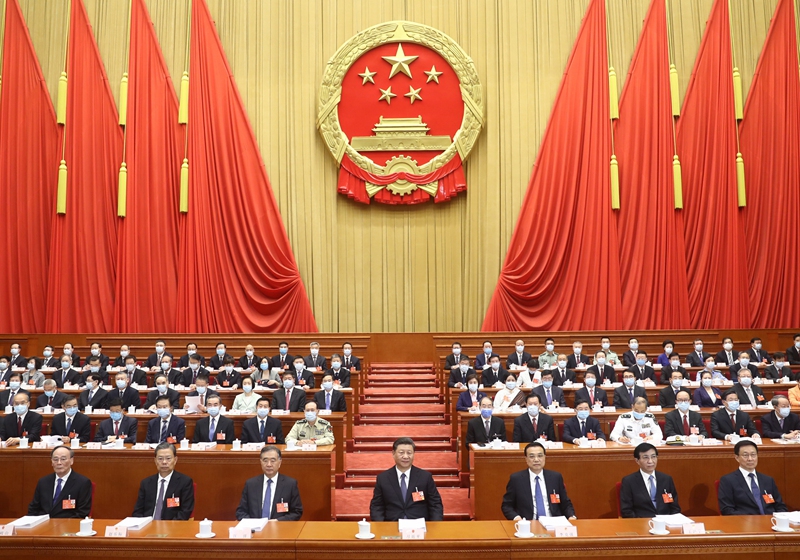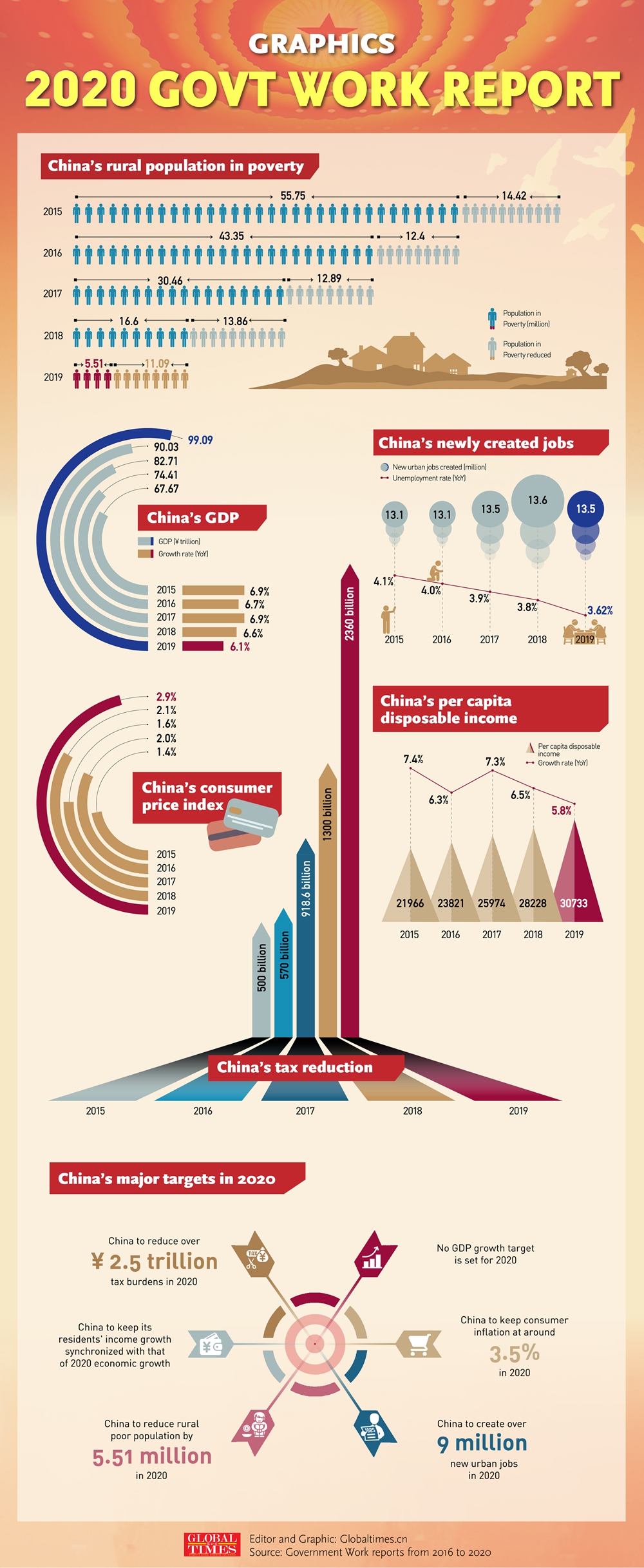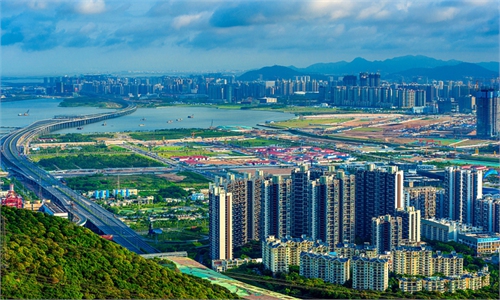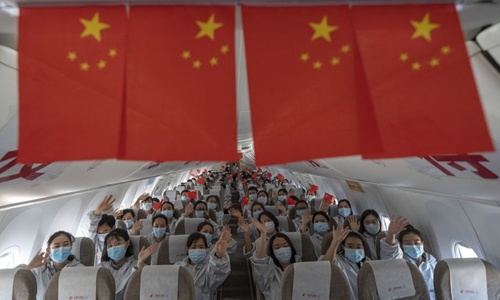China takes decisive moves amid risks
Govt work report highlights challenges, offers blueprint to secure virus-hit economy

The third session of the 13th National People’s Congress (NPC) opens at the Great Hall of the People in Beijing, capital of China on Friday. Leaders of the Communist Party of China (CPC) and the state, Xi Jinping, Li Keqiang, Wang Yang, Wang Huning, Zhao Leji, Han Zheng and Wang Qishan on Friday attended the opening meeting of the third session of the 13th NPC, with Li Zhanshu presiding over the meeting. Photo: Xinhua
China on Friday offered the most comprehensive and pragmatic assessment of the extraordinary circumstances for the country's social and economic development created by the COVID-19 pandemic, and made rare, decisive adjustments in a wide range of areas - from its overarching development goals to specific government spending - to minimize losses and secure social and economic stability amid lingering risks.
This year's Government Work Report, one of the closely-watched documents in China that sets the agenda for social and economic policies for the year, was distinct in form and substance, befitting a particularly trying time for the country not seen in over four decades of rapid ascendance. Among the most significant changes is a decision to end a tradition that has lasted over a quarter of a century to set a specific growth target, underscoring the particularly profound uncertainty ahead for the economy.
But in spite of those sobering realties, China remained unwavering in reaching its long-standing broader development goals of eradicating absolute poverty, and the report offered a robust blueprint for a steady recovery in the world's most populous country and second-largest economy with dozens of targeted policy measures centered on pressing issues such as jobs and living conditions. If properly executed, the plan will be sufficient to bring the country back on the right track ahead of other major economies, analysts said on Friday.
Extraordinary times
The extraordinary circumstances for the country were palpable when Premier Li Keqiang delivered the report at the opening of the annual session of the National People's Congress (NPC), China's top legislature, on Friday morning after over two months of delay due to the COVID-19 epidemic.
Before the session, a minute of silence was observed for the victims of the coronavirus and those who sacrificed in the fight against the pandemic. Television images showed roughly 5,000 lawmakers and political advisers, wearing surgical masks, lowering their heads, which captured a historic moment for millions of Chinese citizens across the country and offered a vivid reminder of how the COVID-19 has upended daily lives and social and economic developments in the country.
"The epidemic has not yet come to an end, while the tasks we face in promoting development are immense," Li said at the start of his speech, before offering a more detailed evaluation of the challenges and progress made over the past several months in epidemic control and economic relief. He declared a "decisive victory" in the battle against the virus, but acknowledged the "great price" China has paid, which he stressed as "a price worth paying."
Though the COVID-19 epidemic has been effectively contained following decisive nationwide measures, the virus took more than 4,600 lives in the country. The price of saving thousands or even millions of Chinese lives was, among others, a record 6.8 percent contraction in GDP in the first quarter of 2020.
Minimizing those losses and dealing with lingering challenges and risks to secure social and economic stability for the rest of the year became the top priority for policymakers, as underscored by the Government Work Report. For the first time since 1995, China scrapped a specific numerical target for GDP growth. While the decision was based on the fact that China still faces some factors "that are difficult to predict," it also gives priority to ensuring stability on jobs, basic living needs, business operations, food security and others areas, the report said.
"We did not set a specific target, but that does not mean economic growth is not important or we will allow the economy to fall freely," Liu Rihong, an official at the State Council who participated in drafting the report, told reporters on Friday, noting that the pace of economic growth will provide support to job security and livelihood.
Some analysts also pointed out that while China scrapped a specific GDP growth target, it stuck to even broader goals of eradicating absolute poverty and doubling GDP based on the 2010 level, an indication of confidence among top officials in the overall fundamentals of the Chinese economy and the strength of the Chinese system.
"If you read closely into the goals outlined in the report, they are much broader," Guan Tao, a former official with the State Administration of Foreign Exchange, told the Global Times on Friday, adding that the goal to double the GDP would be very challenging under the present circumstances.
Commenting on the feasibility of the GDP growth target, He Lifeng, head of the National Development and Reform Commission, the top economic planner, said that even a one-percent GDP growth in 2020 would mean 1.9 times the 2010 GDP, while a three-percent growth mean 1.95 times and a five-percent growth mean 1.99 times - "all very close to the expected target."
Beyond the broader goals, the report also listed a wide range of specific targets for issues essential to social and economic stability, including jobs and consumer prices. It said China will aim to create nine million new urban jobs, keep the surveyed urban unemployment rate at around six percent and cap the consumer price index at around 3.5 percent.
"The Government Work Report highlighted China's people-centered philosophy of development, and issues related to the people's livelihood will be this year's top priority," Zhu Lijia, a professor of public management at the Chinese Academy of Governance, told the Global Times.
Zhu noted that the report was concise, "but the content is comprehensive and touches on every important issue that society cares about… and provides new solutions."
The report, with roughly 10,000 Chinese characters, is only half of last year's and is the shortest since the reform and opening-up policies over four decades ago. Another indication of the focus on jobs is that the word "employment" was mentioned 39 times in the report, slightly more than the word "economy," which was mentioned 37 times.
Targeted measures
Beyond the GDP growth target, markets around the world were also watching for relief measures from Chinese policymakers, with some explicitly counting on a massive stimulus from China to offer support to the global economy as it did during the global financial crisis in 2008-09.
"What we saw in the report this morning is vastly different from the one in 2009. Unlike the master plan to invest trillions of yuan in infrastructure during the global financial crisis, the intensity of stimulus this year is relatively moderate. But the key is that this year, there are more specific measures aimed at addressing different issues," Guan said.
The report contained more than 20 specific measures for various issues. Among the major policy moves is a decision to raise the deficit-to-GDP ratio above 3.6 percent, with a deficit increase of one trillion yuan from last year. China will issue one trillion yuan in government bonds for COVID-19 control.
Some stimulus measures fell short of some expectations that more massive stimulus could be put forward. However, what also exceeded expectations was the level of detail the report went into to direct those specific policies, Guan said.
For instance, the report stated that the two trillion yuan will be transferred to local governments and a mechanism will be set up to ensure that funds will reach county governments to directly benefit businesses and people. It added that the funds can only be used to ensure employment, improve basic living needs and protect businesses through tax and fee cuts. Additionally, the report said that other tax breaks and measures could save businesses over 2.5 trillion yuan this year.
In another indicator of the extraordinary steps Chinese policymakers took to save the economy, the report called for a significant cut in government spending, including a 50 percent cut to outlays on non-essential items.
"The deepest feeling is a boost to the confidence of entrepreneurs," Zhang Jindong, an NPC deputy and chairman of the Chinese appliance retailer Suning, told the Global Times after listening to the report, pointing to the policy measures to support businesses and boost domestic demand. "Although the pressure is unprecedented… we are confident that we will overcome difficulties."
Economists said that if those targeted measures are fully executed, the overall stability of the Chinese economy will be secured and could even emerge stronger, while other major economies are still in the early stages of dealing with the pandemic.
However, preventing a second wave of the pandemic would be key, experts said.
"Good epidemic prevention and control work is essential to ensure economic recovery and growth. We need to restart economic activities amid the normalization of epidemic prevention," Wang Hongwei, a professor at Renmin University of China's School of Public Administration and Policy, told the Global Times, noting that contingency plans should be planned to avoid a "one-solution-fits-all" approach in case of new infections.
Preventing a possible resurgence also remains a top priority. The Government Work Report said that the one trillion yuan special government bond will be used to accelerate research and development of vaccines and medicines, improve the infectious disease prevention mechanism, and boost the healthcare infrastructure.
Li said that while China continues to face risks and challenges "like never before," it stands ready to take on those challenges. "We have unique political and institutional strengths, a strong economic foundation, enormous market potential, and hundreds of millions of intelligent and hardworking people…we will be able to make it through these challenging times, the horizons for China's development are full of promise," Li said, setting off loud applause inside the Great Hall of the People.

2020 Government Work Report Infographic: GT



